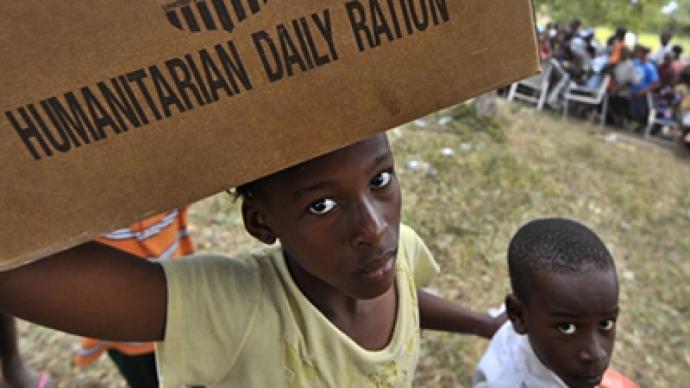Washington NGOs – an industrial complex of their own

While thousands of non-governmental organizations have been set up to combat the problems in Haiti, some are said to be cashing-in on the country's misfortune.
The island is home to more NGOs per capita than any other country in the world.And many Washington-based groups operating in poor countries are in fact pushing their own agendas, all in the name of charity.Washington DC: home of the president, the Congress and the 501(c)(3).Call them think tanks, policy forums, institutes or NGOs – they are the alphabet soup of tax-exempt organizations that influence opinion, push policy agendas and lobby Washington.Professor of the anthropology Adrienne Pine from American University says that “this is something that some anthropologists and activists refer to as the ‘nonprofit industrial complex’.”While millions of nonprofits provide vital services to people around the world, others are created for not-so-charitable purposes.After all, having your very own NGO is not so hard. A little paperwork, a $75 incorporation fee, and you are in business. Even if…well…you do not really exist.The Arcadia Foundation bills itself as a nonprofit dedicated to promoting democracy and curbing corruption worldwide.But critics say it played a key role in the destabilizing efforts that led to the 2009 military coup in Honduras.Although it lists an address in Chevy Chase on its tax returns, the Arcadia Foundation does not have an office. Nor does it have a working phone at any of its nine offices around the world.According to the DC Bureau of Consumer and Regulatory Affairs, the Arcadia Foundation lists only one person on its board, Robert Carmona-Borjas. And since its charter was revoked on September 13 2010, in legal terms the Arcadia Foundation no longer exists.But Arcadia is still alive and well on the web. Critics say that is all it ever was: a tangle of websites and the ambitions of one man.“This foundation he's managed to create an important strong profile for his agenda, which is fundamentally an agenda of supporting the far-right wing throughout Latin America and preventing democracy from taking hold,” American University professor Adrienne Pine says.Still, the Arcadia Foundation has its fans…Actor Ryan Gosling: "I’m Ryan Gosling and I'd like you to join me in supporting the Arcadia Foundation.”Even former Colombian President Alvaro Uribe believes "the Arcadia Foundation is the most important human rights organization working right now."It is also important for the big telecommunications companies, with serious money to be made in Honduras that Carmona-Borjas signed contracts for.The poorer the country, the more influence these Washington-based nonprofits have over its policies.Investigative reporter Jeb Sprague says that Haiti is a prime example.The nation of 10 million people is home to an estimated 10,000 NGOs. That is, one NGO per 1,000 people.“Haiti has sometimes been called the republic of NGOs. It has the most NGOs of any country in the world,” he says.Among them is the Haiti Democracy Project, a Washington-based think thank that observes elections and lobbies the State Department.The group receives sizable donations from members of the tiny Haitian elite. Deep ties between Washington DC nonprofits and transnational elites mean sweetheart deals for big donors.“One of our founding board members [Rudolph Boulous] is an industrialist in Haiti. He has a pharmaceutical company and a brewery, and he contributes from time to time,” executive director of the Haiti Democracy Project, James Morrell, says.Boulos was under investigation for the 2002 murder of Jean Dominique, a Haitian journalist who exposed how Boulos' pharmaceutical company poisoned 60 children.“In many ways Haiti is the model of the future, not Afghanistan, not Iraq where they've spent billions of dollars, where thousands of lives of US soldiers and NATO soldiers have been lost. By comparison, Haiti has been done on the cheap,” says Investigative reporter Jeb Sprague.What is all in a day's work for a seemingly insignificant NGO, in DC can change the political future of a country thousands of miles away. Not to mention those who are forced to live its reality everyday.Brian Concannon, Jr., the director of the Institute for Justice & Democracy in Haiti explained NGOs are displacing the government and doing what the government is not able to do, but typically would.“The result is that you don’t have a consistent and sustainable governmental system. Certainly charity is important. If people are hungry they need food, if people don’t have clean water drilling wells is a good idea, but only a government has the mandate to come up with a national plan for doing that,” he said.Some NGOs are good at helping the people, some are not. There needs to be more than just a mix of NGOs to fill a void left by the government.NGOs are often subverting and working against the government, which does not help the nation’s development, recovery or the lives of the Haitian people.“You obviously have the ideological agenda,” said Concannon . “There’s also an economic agenda.”












